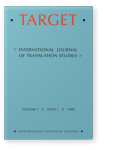Vol. 1:1 (1989) ► pp.95–109
Plato, Bacon and the Puritan Apothecary
The Case of Nicholas Culpeper
During the seventeenth century the London apothecaries, most of them Puritans, sought to destroy the control the London College of Physicians exercised over the practice of medicine in the capital. Cromwell's success in the Civil War gave the apothecaries the advantage in this fight, and the major weapon they used against the College was translation of the Latin professional literature into English and wide dissemination of the translations, which often included some very unbridled footnotes to embarass the College. The most important of these apothecary-translators was Nicholas Culpeper (1616-1654). His practice in both medicine and translation is typical of the Puritan tradition in combining four influences: the philosophy of Francis Bacon, medieval interpretations of Ovid's account of Creation (Metamorphoses I.85), the Platonist flavour of medieval alchemy, and the Bible, particularly as translated by the Calvinists (the "Geneva Bible"). Culpeper was writing for a public that saw no distinction between secular and religious knowledge, and which took from Bacon and Seneca the conviction that polished language could not co-exist with truth. Thus his translation style, taken ultimately from the Puritan pulpit and schoolroom, is unadorned, accurate, and literal in that his versions respect the discourse order and content of the original.
Article outline
- Introduction
- Nicholas Culpeper
- Bacon and the Apothecaries
- Ovid and the Apothecaries
- The Apothecary and Contemplation
- The Apothecary and the Bible
- Puritan Translation Practice
-
References
References
Cited by
Cited by 1 other publications
This list is based on CrossRef data as of 14 april 2024. Please note that it may not be complete. Sources presented here have been supplied by the respective publishers. Any errors therein should be reported to them.
